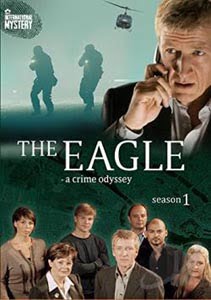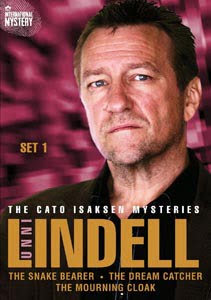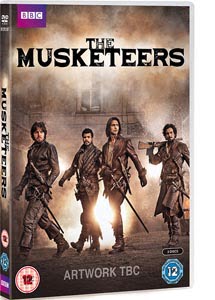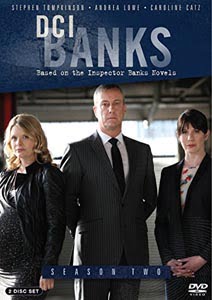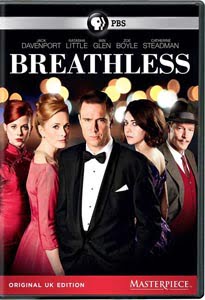High-Flying Detectives Span Global Television Markets
Reviews by Sharon L. Shervington
The Eagle, an ensemble crime drama from Denmark, has landed on American shores. This show, though not a drama per se, manages to reach a level that compares favorably with the political drama Borgen, another feature from Denmark that has captivated audiences around the world.
Our hero, Halgrim Halgrimson, is a crackerjack detective with a piercing eagle-like gaze that cuts straight to the heart of some very convoluted matters. On his way to Iceland, a flight that would have taken him to his mother’s deathbed, Halgrimson is pulled off and put in charge of handling potentially deadly events that have already left one person dead at the airport and another on a plane with a gun.
Despite his outward self-assurance, Halgrimson has been hiding a devastating secret from childhood that has impacted all of his relationships. A high point of the series is when this secret is finally revealed. Over the course of eight hour-long episodes he confronts his inner demons along with external devils in the form of deadly human traffickers, terrorists, and just plain bad people.
Beautifully-shot Icelandic scenery, evocative music, and a range of nuanced performances from the leads—as well as from actors who play Halgrimson’s boss and his teammates—make this show a wonderfully compelling interlude.
Another standout from Scandinavia is Unni Lindell: the Cato Isaksen Mysteries. One of the best things about these drama thrillers is that, unlike most similar American programming, the plots involve characters at many different points in their lives. Also, longer episodes allow for greater character development, making viewers more vested in what happens to series regulars.
Cato Isaksen is a middle-aged detective working in Oslo with three sons by two different mothers. As the immediacy of the murders unfolds, he and his team try to solve them at the same time that Isakson manages his complicated, yet fascinating personal life. For example, we see the effects of his work on his children and the tender yet often troubling ways that family deals with its members.
Anyone who has parented a teenager will recognize universal, iconic moments and conflicts, such as when Isakson fears that his son has become involved with a bad crowd.
Each of the six films consists of two 90-minute episodes in which tension-building reaches a fever pitch, and the killers are always a surprise.
The thing about too many remakes is that many of them tend to be so boringly derivative. But that is not the case with The Musketeers, a show from BBC Worldwide that is based on Alexandre Dumas’s The Three Musketeers.
This is material that has been redone many times, but here it comes across as very fresh, in part because every aspect of the production is top-notch, from costumes to writing to plotlines, but also because we get to look more closely at the underlying motivations that drive the principals, especially Athos and Porthos.
Constance, Milady, and the Cardinal are all here, as are a welcome feminist sensibility that infuses the narrative in a very natural way. Santiago Cabrera and Luke Pasqualino (of Borgias fame) are especially fine. The Musketeers contains ten hour-long episodes.
Also new from BBC Worldwide is DCI Banks Season Two, in which Detective Chief Inspector Banks becomes a murder suspect in a case that involves his brother. Aspects of the Inspector’s character and how it was formed are highlighted. And then the hunter becomes the hunted.
So much of Season One stood out because of the simpatico nature of the relationship between the DCI and his younger, blonde partner Annie Cabot. But as Series Two begins she is about to go on maternity leave, and is replaced by the emotionally repressed, by-the-book Helen Morton. Unfortunately, there is really no chemistry between Banks and Morton, which does make the second series somewhat less satisfying than the first—though the storylines are memorable.
The latest Masterpiece Mystery from PBS Direct, Breathless, also is a period piece, and it too is memorable. This show can legitimately be described as Mad Men meets Call the Midwife (the latter a strong hit for BBC Worldwide that continues to boast legions of adoring fans.).
In this drama set in the early 1960s the main characters are the doctors and nurses who staff an ob/gyn unit in central London that serves a varied population. Instead of Don Draper we have Otto Powel (played by Jack Davenport), handsome, suave and a gifted surgeon who also adheres to the highest ethical standards, even when that comes with a steep price. Much more principled than Don Draper, the two nevertheless share the kinds of shattering secrets from the past that are hard to escape.
It is hard to say whether their cases or their marriages are more complex, but the most important story arc revolves around events that occurred a decade earlier when two of the doctors were in the military.
The deeply gifted Iain Glen gives an award-worthy knockout performance here. His role is pivotal as well as deeply villainous and unsympathetic. Yet in this actor’s capable hands, what could have been a one-dimensional portrait becomes much more. Two sisters who are nurses hiding their own secrets round out the cast, along with the actress who plays Otto Powel’s wife with a Grace Kelly elegance and quiet flair. The cliffhanger finale will have audiences eagerly awaiting season two.
This is an all-around great month for history buffs. Al Capone: Icon is a great way to learn more about Prohibition, but more importantly about how this larger-than-life gangster’s legacy continues to impact society even today.
For example, it was Al Capone who was one of the very first Americans to employ black musicians in his Chicago clubs—something that the musicians interviewed in this hour-long documentary readily acknowledge. This is also an interesting companion to HBO’s Boardwalk Empire Season Four, which was reviewed here last month.

